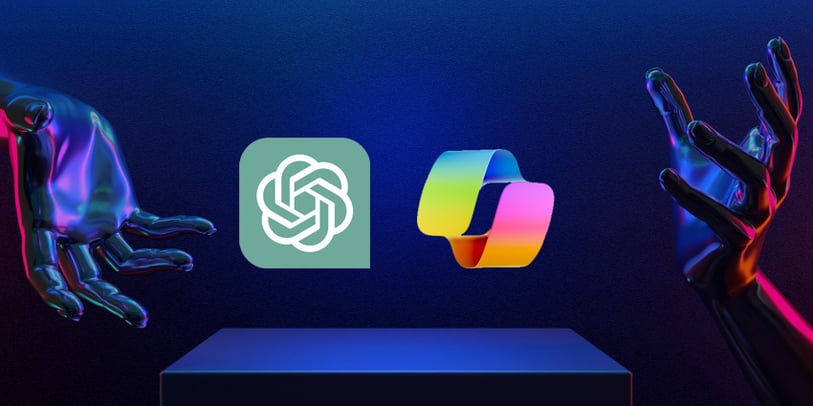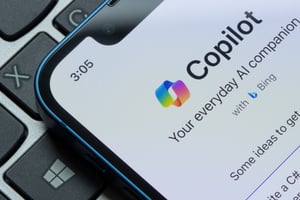The field of AI is advancing at an incredible pace, and it's natural for us to focus on the changes...
Copilot vs ChatGPT (2025): Which AI Should Your Business Use?
Not sure whether to use Microsoft Copilot or ChatGPT for your business? This quick guide breaks down the key differences and shows how to get the best of both in 2025.
Introduction
Artificial intelligence is no longer a futuristic concept. It’s here, shaping how businesses operate every single day. From automating reports to creating marketing content, AI is helping teams save hours and make smarter decisions. But with so many tools available, one of the biggest questions business leaders are asking in 2025 is:
Should we use Microsoft Copilot or ChatGPT — or both?
At Techify, we recently hosted a webinar, Copilot vs ChatGPT: The Epic Showdown (watch the replay on YouTube), to help business leaders cut through the hype and understand the real differences between these two AI heavyweights. Here’s a breakdown of the key takeaways from that session — and what your organization should consider before making its AI move.

Why This Choice Matters
AI isn’t just a “nice-to-have” anymore. It’s quickly becoming the backbone of productivity, creativity, and decision-making. According to industry stats:
-
ChatGPT holds over 80% of the AI chatbot market, processing an estimated 2.5 billion prompts every day.
-
Microsoft Copilot is now used by nearly 70% of Fortune 500 companies, proving its traction in the enterprise world .
This isn’t about hype. It’s about choosing the right AI to save your business time, cut costs, and reduce risk.
What is Microsoft Copilot?
Microsoft Copilot is an AI assistant built directly into Microsoft 365 apps like Word, Excel, Outlook, and Teams. Think of it as an employee who already knows your files, emails, and workflows.

Key strengths of Copilot include:
-
Security and compliance: Data stays within your Microsoft ecosystem, making it easier to meet governance standards.
-
Workflow automation: Summarize emails, build reports in Excel, generate PowerPoint drafts, and more.
-
Ease of adoption: For organizations already using Microsoft 365, Copilot fits seamlessly into existing tools.
In short: Copilot is best when your team spends most of their day inside Microsoft apps and you want AI to streamline those workflows.
What is ChatGPT?
ChatGPT, developed by OpenAI, is a standalone conversational AI tool. Unlike Copilot, it’s not tied to Microsoft 365, which gives it more freedom. ChatGPT can help with almost any task you throw at it, from content creation to coding assistance, provided you supply the right context.
Key strengths of ChatGPT include:
-
Creative powerhouse: Great for brainstorming, writing, and generating new ideas.
-
Cross-platform flexibility: Works outside the Microsoft ecosystem, integrating through APIs and plug-ins.
-
Customizable: ChatGPT Enterprise allows organizations to build private workspaces, deploy AI agents, and manage data securely.
In short: ChatGPT is like a consultant — it can do almost anything, but you need to guide it with the right prompts and context.

Side-by-Side Use Cases
The best way to see the difference is through use cases.
Use Microsoft Copilot for:
-
Digging through files and internal data
-
Automating tasks in Word, Excel & Teams
-
Keeping sensitive business information secure
Use ChatGPT for:
-
Exploring big ideas
-
Creating fresh content
-
Connecting with other toolsets
-
Sparking innovation
Most businesses don’t choose one or the other. They use both where each shines.
Integration and Workflow Fit
-
Copilot is built into Microsoft 365. If your business lives in Outlook, Excel, and Teams, it delivers instant value with almost no setup.
-
ChatGPT requires more integration (manual uploads, connectors, or APIs), but that effort pays off with flexibility. Especially if you use tools outside of Microsoft’s ecosystem.
Example: A finance team might prefer Copilot for Excel reports, while a marketing team could lean on ChatGPT for creative campaign copy.
Security & Compliance
Security is a make-or-break factor for many organizations.
-
Copilot inherits Microsoft’s enterprise-grade security, compliance, and governance. Data stays within your tenant and follows existing permissions.
-
ChatGPT varies by plan. ChatGPT Enterprise offers strong guarantees around data privacy and no training on your inputs, while free or Plus versions require careful oversight to avoid risks.
Key takeaway: If you’re handling sensitive data or operate in a regulated industry, Copilot has the clear edge. If you use ChatGPT, make sure policies are in place to govern usage.

Cost and ROI
-
Microsoft 365 Copilot: Roughly $30/user/month as an add-on license for eligible Microsoft 365 plans.
-
ChatGPT: Free version, ChatGPT Plus ($20/month), or Enterprise (custom pricing).
But here’s the truth: ROI matters more than sticker price. If Copilot saves a finance employee 2 hours a day in Excel, or ChatGPT helps a marketing team produce campaigns faster, the productivity gain outweighs the monthly fee.
Pros and Cons at a Glance
Copilot Pros:
-
Deep integration in Microsoft apps
-
Secure & compliant
-
Easier for existing Microsoft 365 users
Copilot Cons:
-
Limited outside Microsoft ecosystem
-
Higher per-user cost
ChatGPT Pros:
-
Creative and flexible
-
Works outside Microsoft apps
-
Highly customizable
ChatGPT Cons:
-
Security depends on plan
-
Accuracy requires fact-checking
-
More setup for workflows
Which Should You Use?
The short answer: both!
-
Copilot is your secure productivity engine inside Microsoft.
-
ChatGPT is your flexible creativity and innovation partner.
A hybrid approach gives you the best of both worlds. That said, it requires clear boundaries, governance, and training so employees know when and where to use which tool.
The Future of AI Tools (2025 and Beyond)
Both platforms are evolving quickly:
-
Microsoft is expanding into industry-specific Copilots for Sales, Finance, and Service.
-
ChatGPT is moving toward AI agents that can automate multi-step workflows, with larger context windows and multimodal capabilities.
-
Expect pricing and licensing changes as adoption grows and competition heats up.
The landscape will only accelerate, which is why building a thoughtful AI strategy today is critical.
Conclusion
If you only remember three things from this showdown, make it these:
-
Copilot is best for internal data, Microsoft workflows, and security-sensitive tasks.
-
ChatGPT is best for exploration, creativity, and integration with non-Microsoft tools.
-
You don’t have to pick one. Many businesses win by using both in the right context.
Ready to Take the Next Step?
Choosing the right AI tool is just the beginning. The real question is: how do you roll it out safely, strategically, and in a way that actually drives ROI?
That’s where Techify comes in.
👉 Start with our AI Readiness Assessment. to see where your business stands and what next steps should be.
👉 Watch the full webinar replay on YouTube.
AI isn’t about technology for technology’s sake. It’s about making your business faster, safer, and smarter. And the sooner you start, the bigger your advantage will be.
Ready to protect your business?





